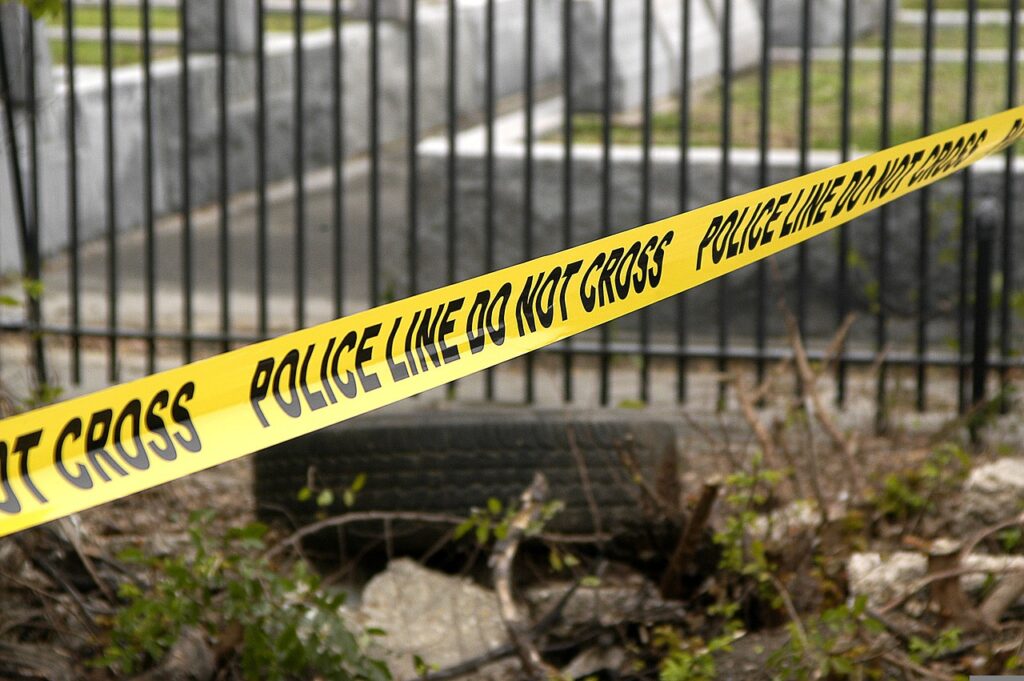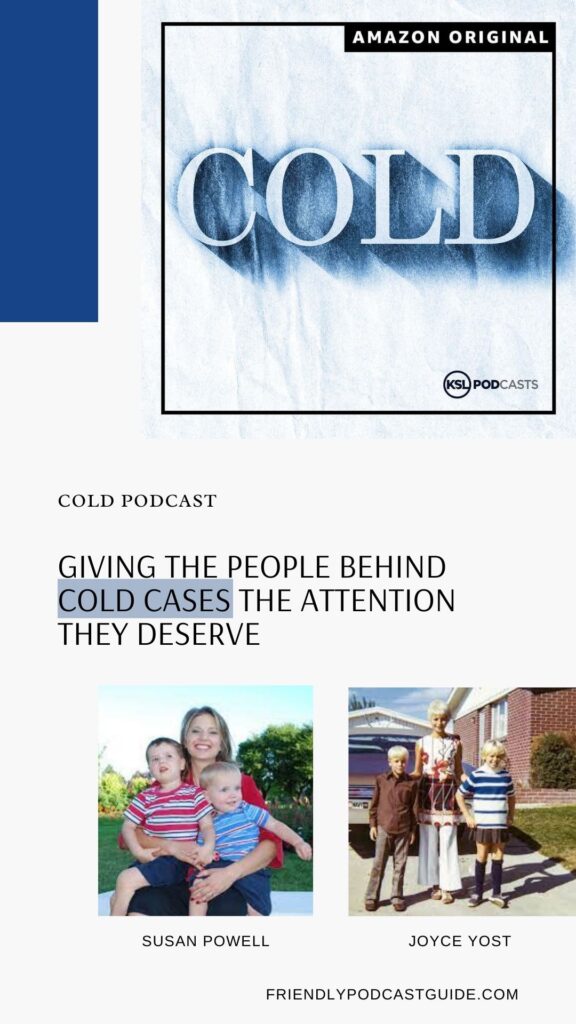Episode Description
This week’s episode is about Cold a podcast about cold cases that is meticulously researched and quite compelling.
Links from the Episode:

More About Cold
The show description is Cold, is a narrative podcast series focused on missing persons cases. Investigative journalist and host Dave Colley takes on a single story each season. The length of each episode is about an hour, and it’s not exactly kid friendly. The language in this podcast is not explicit, but the topics are pretty heavy. They include domestic abuse, sexual assault, and other hard topics.
Along those same lines, it is about missing persons cold cases, and the people that are missing are presumed dead. So kind of heavy. Also pretty fascinating, so probably not for kid ears unless they’re very prepped and ready for that kind of listening. This is a short series with two seasons and a third one on the way.
And the first several episodes of each season are available wherever podcasts can be found, and the entirety of both seasons are exclusively on Amazon music.
FPG Partner Bookshop.org
Bookshop.org is a great way for you to buy books online, but also support local bookstores.
You can find a specific local bookstore that you would like to support, and they will receive the full profit off of your order, or your order will contribute to an earnings pool that will be evenly distributed. Independent bookstores. You can see some of my favorite books for me and for my kiddos by going to my affiliate link at bookshop.org/shop/fpg.
Introduction to Dave & Cold
My name is Dave Cawley. I’m an investigative journalist. I work for KSL in Salt Lake City, Utah. And for the past, oh, let’s see, about four years now, I have been full-time producing a podcast called Cold, and it’s an investigative narrative podcast series about cold cases.
How Cold Started
So, prior to becoming a podcaster full time, I worked as a journalist on the radio for a little over 15 years. All of it in Utah and focusing on stories of the day. And through the course of that, I covered a lot of different court cases and crimes, and one of those was, Mysterious disappearance of a woman in 2009 named Susan Powell.
This woman disappeared, widely believed to have been killed by her husband. Her body’s never been found, and the husband was never charged or even arrested in connection with her disappearance, and he ended up taking his own life. And so this was a case that. I had followed a lot of people in the community, followed and had a lot of questions about, and I just became obsessed with trying to figure out the answers to some of those questions.
And being a journalist, I had the opportunity to, you know, spend time interviewing people and digging into records and doing that kind of work. And it just kept getting bigger and bigger and bigger. And, finally my news director and I sat down talking about what we were gonna do with this Massive unfolding story that we couldn’t fit into 30 seconds on the radio. It was like, well, you know, there’s this new kind of thing that everyone’s doing, which is podcasting, right? And that, so that’s kind of how that came around.
Dave’s Process for Finding Information & Putting Together Cold
Time was definitely a precious commodity, You know, my full-time job was really reporting on the radio and producing a talk show. So I would take material home, I would, work on it in the evening on my own time after hours because I was just so fascinated, like it was peeling back the layers of the onion. With this story, every new detail that you would uncover would just raise more questions, would take you, you know, to more people who.
You would reach out and interview them or ask them questions and they would tell you something that you would just be going, You’ve gotta be kidding me. That’s insane. It’s crazy. And so it, it, it really kind of reached a tipping point where in order to spend the time putting it together, this is a scripted reported fact check kind of thing.
So we have to spend a lot of time not only in the writing and the production, but just making sure that we have all of our details right. And so that’s kind of where the bosses at KSL, where I work eventually, were like, If this is gonna happen, we’re just gonna have to put you on it full time. The police department that investigated this when they declared their case cold, basically realized under public records laws, they were gonna have to start revealing some information.
Whole case had been under a court seal, so it was. Kept secret for all this time. And they were able to get that lifted in 2013. They said, Here’s our case file and start looking through it if you want. They gave us this flash drive that had, you know, 30 or 40,000 pages of their documents, the records on it.
And so it was a lot of reading and then, you know, taking notes, building a timeline. So it was a really meticulous kind of piece by piece thing. And through the course of that, you know, you, you start seeing. The threads of the story, like how they weave together.
And so I think one of the, if you can call it fun, I mean it’s, it’s not something that’s a fun story to tell, but the creative process of beginning to trace, okay, here’s, you know, here’s this thread about the husband Josh Powell and who he was as a child and his early relationships and how that influenced who he became later. That was really gratifying to be able to, to work on.
The Vibe of Cold
I think a lot of True crime podcasts really lean heavily into this like ick factor and kind of the creepiness of it. I would hope that Cold doesn’t do that. I try to present it as journalistically as possible, but that can also sound kind of boring. So going back to what I said before, I really hope that listening to Cold is, Just like listening to a really solid audiobook, like it should be something that hooks you because the narrative is strong without me having to, you know, get into graphic depictions of the crime.
Hopefully the vibe is something that gives you confidence that what you’re listening to is factual. And that it’s also enlightening that it allows you to learn something about you know, with Cold Season One and the Susan Powell case, it became a lot about intergenerational abuse, about domestic violence.
And if I tell you I’m going to. Present you with a domestic violence podcast, you might say, You know what? I don’t really find that entertaining. I don’t wanna listen to that. But if I tell you, let me tell you about this. Husband and wife, and this relationship that they had that went completely off the rails where this woman had no idea her father-in-law was going to make a romantic pass at her, that her husband would support his dad after that happened and that.
Only a few years later, this woman would disappear and become the subject of international attention. You might kind of sit up straight and go, Well that does sound interesting. Tell me more. Right. So hopefully that’s, hopefully that’s the vibe you take from Cold.

A Story With a Purpose
I view Cold very much as being a story with a purpose. As a journalist, it’s not my job to advocate. My job is to, to the best of my ability uncover truth and to hold people who are in power to account. We try to do that in Cold, but also recognizing that this is a podcast that talks about some of these really weighty issues that people.
Who are listening will be in many cases affected by these same types of issues, right? You will have people who have experienced domestic abuse listening to this podcast. We felt. Was very important to include a call out to resources at the conclusion of every episode. So for cold season one, at the end of every single episode, you’ll hear me say, if, if this sounds familiar at all in your own life, to please reach out.
You know, there’s domestic violence help available for free in the United States to anybody at thehotline.org. In season two, where we were talking a lot about sexual assault again, we were referring people who might have some of those similar types of trauma experiences in their own lives to connect with the rape, abuse and incest national network, which is rainn.org.
And just making sure that we’re being responsible in helping people realize that there are free resources out there 24/7 to help them if they have those kinds of, you know, experiences in their.
Where to Find Cold
Currently Amazon Music is the exclusive home for cold season one, with the exception of the first four episodes. So you can find the first four episodes of cold season one anywhere you listen to podcasts. Likewise with cold season two. You can find that Apple Podcast anywhere else. Just search for the cold podcast.
We’re also on social media. Be that you know Twitter, Instagram, Facebook, Reddit at the Cold podcast.
